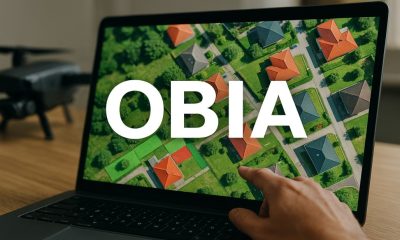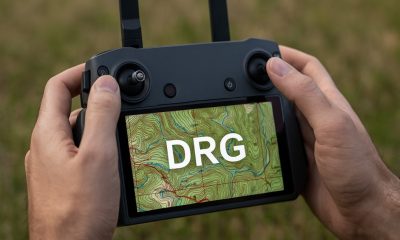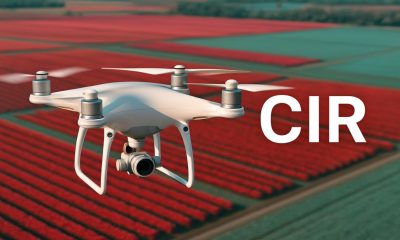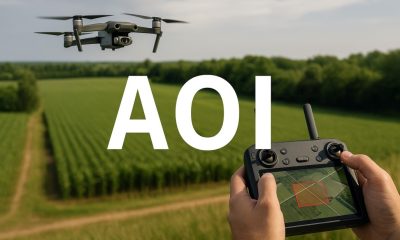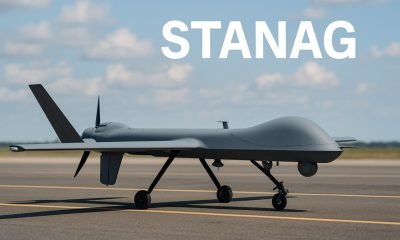- Acronym Guide
- AAM
- ABS
- AC
- ACAS
- ADS-B
- AFAC
- AGL
- AI
- AIM
- ALS
- AM
- AMA
- ANSP
- AOI
- APPI
- AUV
- AUVSI
- ARPAS-UK
- ASTM
- ATC
- BVLOS
- CAA
- CAAC
- CAB
- CASA
- CATT
- CBO
- CBR
- CBRN
- CDMA
- CDR
- CFR
- CIR
- COA
- COMINT
- CORS
- COTP
- COTR
- CPTED
- CV
- C2
- DAA
- DEM
- DFI
- DFS
- DGCA
- DHS
- DOD
- DPA
- DPEs
- DRG
- DRO
- DSM
- DSMX
- DSP
- DSSS
- DTM
- EASA
- EFT
- EO
- EOD
- EO/IR
- ELINT
- EMI
- ESC
- EVLOS
- eVTOLs
- FAA
- FCC
- FCS
- FHSS
- FICCI
- FLIR
- FOB
- FOV
- FPS
- FPV
- GBDAA
- GCP
- GCS
- GDPR
- GML
- GNSS
- GPS
- GSD
- GVC
- HDR
- HOGE
- IACRA
- ICAO
- ICS
- IMU
- INS
- IR
- ISA
- ISR
- ITU
- JARUS
- LAAMS
- LAANC
- LAATM
- LAI
- LBA
- LIDAR
- LOS
- LSALT
- MAC
- MAVLink
- MLIT
- MMS
- MSL
- MTOM
- NDAA
- NCSL
- NFZ
- NIST
- NMEA
- NOTAM
- NPA
- NPRM
- NTIA
- OBIA
- OEM
- OFDM
- OOP
- PASM
- PAV
- PCV
- PdM
- PEC
- PIC
- PID
- PIPL
- PLD
- PM
- PN
- PPK
- PPS
- PSM
- PWM
- UAM
- UAOP
- UAS
- UASTM
- UAV
- UCAVs
- UHD
- UHF
- USV
- UTM
- RAIM
- RCC
- RCS
- RFI
- ReOC
- RePL
- RMS
- ROI
- RPAS
- RPC
- RTH
- RTK
- SaR
- SAR
- SARP
- SBAS
- S.Bus
- SBIR
- SEDENA
- SfM
- SFOC
- SIGINT
- SLAM
- SMS
- SORA
- STANAG
- STTR
- sUAS
- TCAS
- TCCA
- TFR
- TIN
- TOF
- TP
- TPS
- TSA
- VHF
- VLOS
- VTOL
Drone Acronyms
What is ReOC (Remote Operator’s Certificate)?
By
Jacob StonerTable Of Contents

Definition
ReOC stands for Remote Operator’s Certificate. It is a certification issued by the Civil Aviation Safety Authority (CASA) in Australia, which authorizes an organization to conduct commercial drone operations. The ReOC certifies that the organization has the necessary procedures, safety systems, and qualified personnel to operate drones in compliance with CASA regulations.
Usage
The ReOC is required for any organization that intends to operate drones commercially in Australia, particularly when managing multiple drone pilots or conducting more complex operations. The certificate ensures that the organization adheres to a comprehensive safety management system, meets regulatory requirements, and operates its drones responsibly and safely.
Relevance to the Industry
The ReOC is vital for businesses that wish to use drones as part of their operations, as it enables them to legally manage and conduct commercial drone activities. This certification is particularly relevant for companies offering drone services, such as aerial photography, surveying, and inspections, as it demonstrates compliance with CASA’s stringent safety standards and operational protocols.
How Does a Remote Operator’s Certificate (ReOC) Work?
Application Process:
- Eligibility and Preparation:
- Organizational Requirements: To apply for an ReOC, your organization must have a structure in place that supports safe and compliant drone operations. This includes having personnel with appropriate qualifications, such as Remote Pilot Licenses (RePLs), and the capacity to manage the safety and operational aspects of drone activities.
- Developing Documentation: The application process requires detailed documentation. This includes developing a comprehensive Operations Manual that outlines your organization’s procedures for conducting drone operations safely. This manual must cover areas such as risk management, maintenance protocols, emergency procedures, and compliance with CASA regulations.
- Safety Management System (SMS):
- Risk Management: A key component of the ReOC is the implementation of a Safety Management System (SMS). This system identifies potential risks associated with drone operations and outlines the measures your organization will take to mitigate those risks. The SMS should include regular risk assessments, incident reporting protocols, and continuous monitoring to improve safety practices.
- Operational Procedures: The SMS must also detail the standard operating procedures (SOPs) for drone operations, including pre-flight checks, flight planning, in-flight monitoring, and post-flight procedures. These SOPs ensure that all operations are conducted consistently and safely.
Submission and Assessment:
- Application Submission:
- Documentation Submission: Once your organization has developed the necessary documentation, you submit your application to CASA. This includes the Operations Manual, details of your Safety Management System, proof of insurance, and evidence that all drone pilots hold valid RePLs.
- CASA Review: CASA will review the submitted documentation to ensure it meets all regulatory requirements. This review may involve an assessment of the organization’s safety procedures, operational capabilities, and compliance with Australian aviation laws.
- Interview and Inspection:
- Personnel Interview: CASA may conduct interviews with key personnel in your organization, such as the Chief Remote Pilot and other staff responsible for safety and compliance. The interview assesses their understanding of the operational procedures, safety management, and regulatory requirements.
- Site Inspection: Depending on the nature of your operations, CASA may also conduct an on-site inspection. This inspection evaluates your organization’s facilities, equipment, and operational setup to ensure that everything is in place for safe and compliant drone operations.
Issuance and Compliance:
- Certificate Issuance:
- Receiving the ReOC: If CASA is satisfied with the application, interviews, and inspections, they will issue the Remote Operator’s Certificate (ReOC). This certificate authorizes your organization to conduct commercial drone operations in accordance with the procedures and safety protocols outlined in your Operations Manual.
- Operational Flexibility: The ReOC provides your organization with the flexibility to manage multiple drone pilots and operations across various locations, as long as you adhere to the conditions specified in the certificate and maintain compliance with CASA regulations.
- Maintaining Compliance:
- Ongoing Oversight: As an ReOC holder, your organization is responsible for maintaining continuous compliance with CASA regulations. This includes conducting regular reviews of your Safety Management System, updating the Operations Manual as needed, and ensuring that all personnel remain properly trained and certified.
- Incident Reporting: CASA requires that any incidents or safety breaches be reported promptly. Your organization must have a clear process for incident reporting and investigation, with the aim of preventing future occurrences and improving operational safety.
- Renewal and Audits: The ReOC typically requires periodic renewal, during which CASA may conduct audits to verify ongoing compliance. This includes reviewing your organization’s safety records, operational procedures, and any updates made to your SMS or Operations Manual.
Advanced Operations:
- Special Permissions:
- BVLOS and Night Operations: If your organization plans to conduct advanced operations, such as Beyond Visual Line of Sight (BVLOS) flights or night operations, you may need to apply for additional approvals from CASA. These operations require a higher level of safety assurance and may involve further documentation, risk assessments, and operational procedures.
- Custom Operations: For unique or large-scale projects, your organization may need to work closely with CASA to develop customized operational plans that meet both the regulatory requirements and the specific needs of the project.
By following these steps, organizations can obtain and maintain a Remote Operator’s Certificate (ReOC), enabling them to conduct commercial drone operations legally, safely, and efficiently in Australia. The ReOC ensures that all aspects of drone operations are managed with a high level of professionalism and compliance with CASA’s stringent safety standards.
Example in Use
“The company obtained a Remote Operator’s Certificate (ReOC) from CASA, allowing them to expand their drone services across Australia and take on larger, more complex projects.”
Frequently Asked Questions about ReOC (Remote Operator’s Certificate)
1. What is the process for obtaining a Remote Operator’s Certificate (ReOC)?
Answer: To obtain an ReOC, an organization must:
- Develop a Safety Management System (SMS): The organization needs to develop a comprehensive safety management system that outlines how drone operations will be conducted safely. This includes risk assessments, operational procedures, maintenance protocols, and emergency response plans.
- Training and Certification: Ensure that all drone pilots within the organization hold a Remote Pilot License (RePL) and have completed necessary training.
- Application Submission: Submit an application to CASA, including all required documentation such as the safety management system, proof of RePLs, and other operational details.
- CASA Assessment: CASA will assess the application, which may include a review of the documentation, an interview with key personnel, and possibly an on-site inspection.
- Certificate Issuance: If CASA is satisfied that the organization meets all requirements, they will issue the ReOC, allowing the organization to commence commercial drone operations.
2. What are the responsibilities of an ReOC holder?
Answer: An ReOC holder is responsible for:
- Maintaining Compliance: Ensuring that all drone operations comply with CASA regulations, including maintaining up-to-date certifications, following safety protocols, and adhering to operational limits.
- Safety Oversight: Implementing and overseeing the safety management system to ensure safe drone operations. This includes conducting regular risk assessments, updating procedures as needed, and ensuring that all personnel are trained and competent.
- Reporting Requirements: Reporting any incidents or safety breaches to CASA as required by law. This includes submitting detailed reports on accidents, near-misses, or any other operational issues that could affect safety.
- Ongoing Training: Providing continuous training and professional development for drone pilots and other relevant staff to keep them informed of regulatory changes and best practices.
3. What is the difference between an ReOC and an RePL?
Answer: The difference between an ReOC and an RePL is:
- ReOC (Remote Operator’s Certificate): The ReOC is an organizational certification that authorizes a company or entity to manage and conduct drone operations. It focuses on the overall safety management system, procedures, and compliance of the organization.
- RePL (Remote Pilot License): The RePL is an individual certification that licenses a person to operate drones for commercial purposes. It focuses on the pilot’s ability to safely operate a drone in accordance with CASA regulations.
For examples of these acronyms visit our Industries page.
As the CEO of Flyeye.io, Jacob Stoner spearheads the company's operations with his extensive expertise in the drone industry. He is a licensed commercial drone operator in Canada, where he frequently conducts drone inspections. Jacob is a highly respected figure within his local drone community, where he indulges his passion for videography during his leisure time. Above all, Jacob's keen interest lies in the potential societal impact of drone technology advancements.
